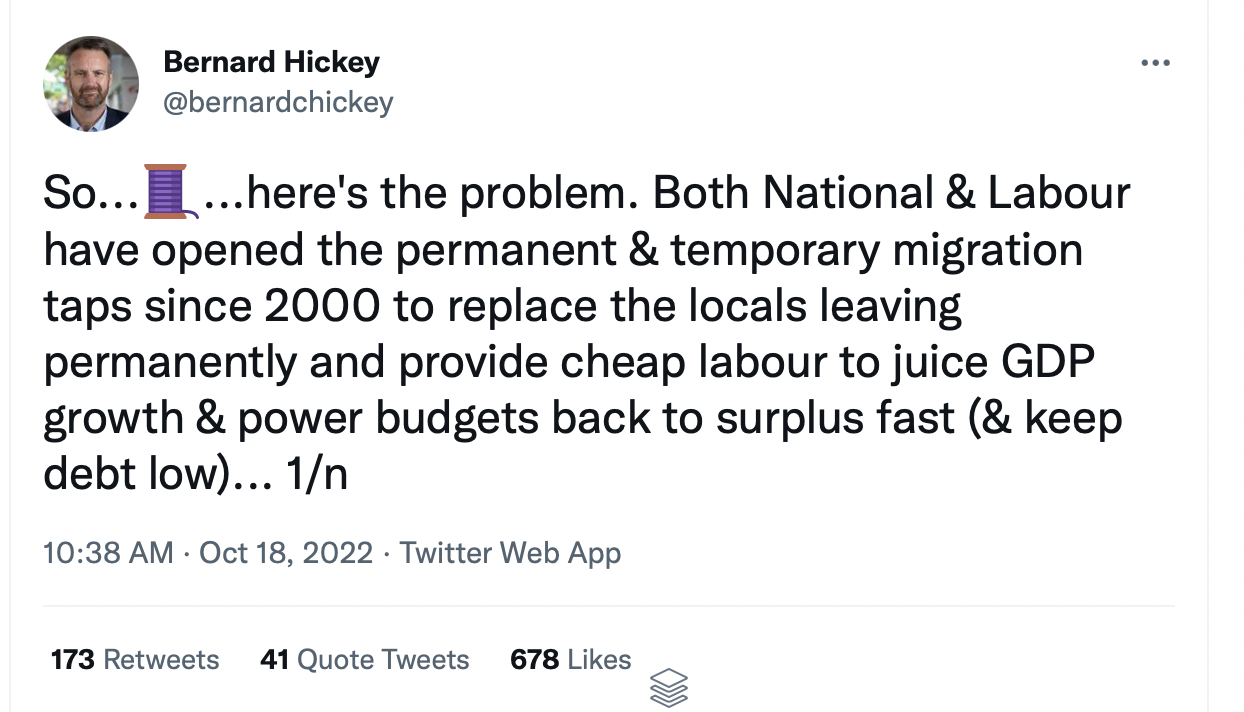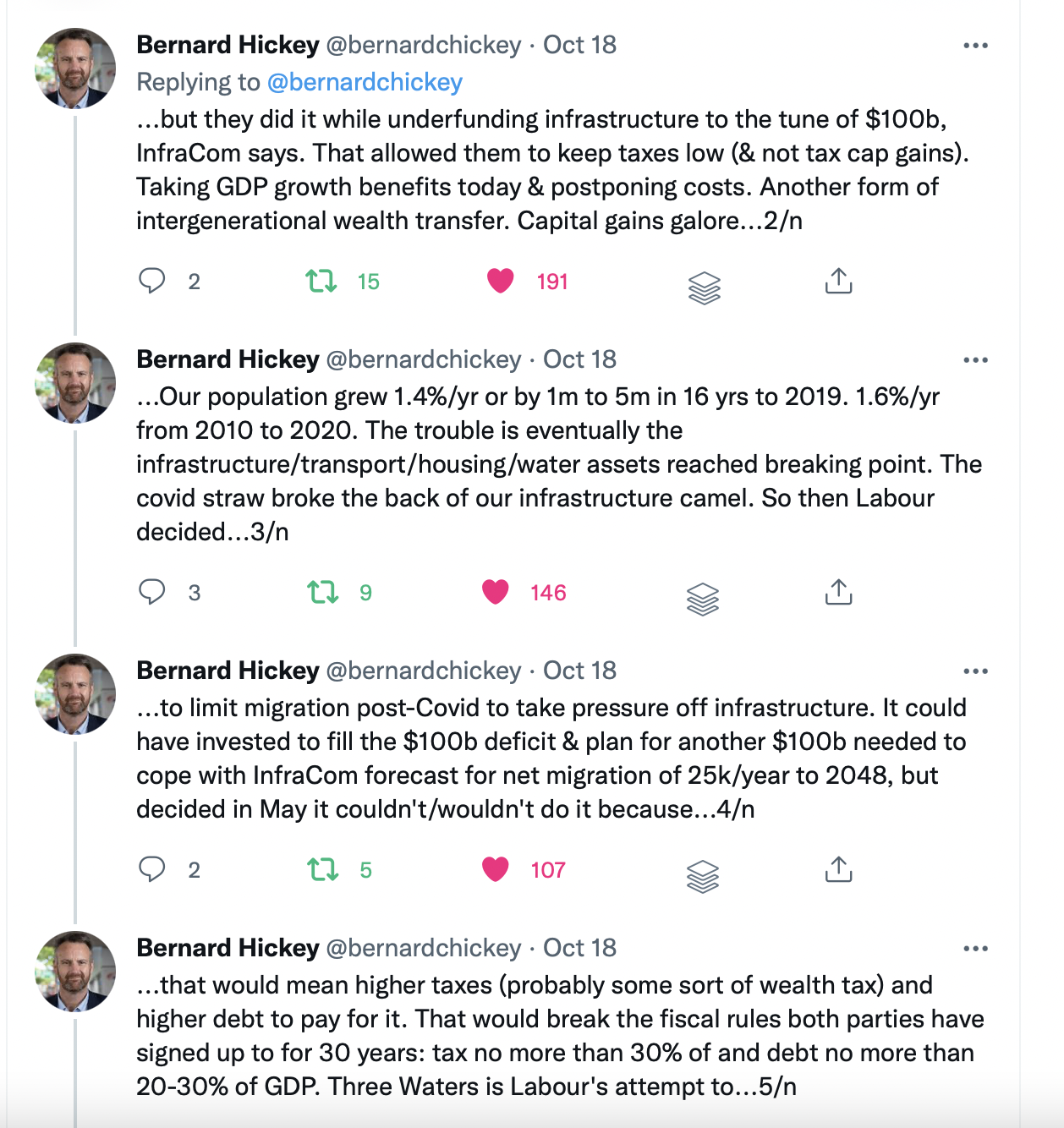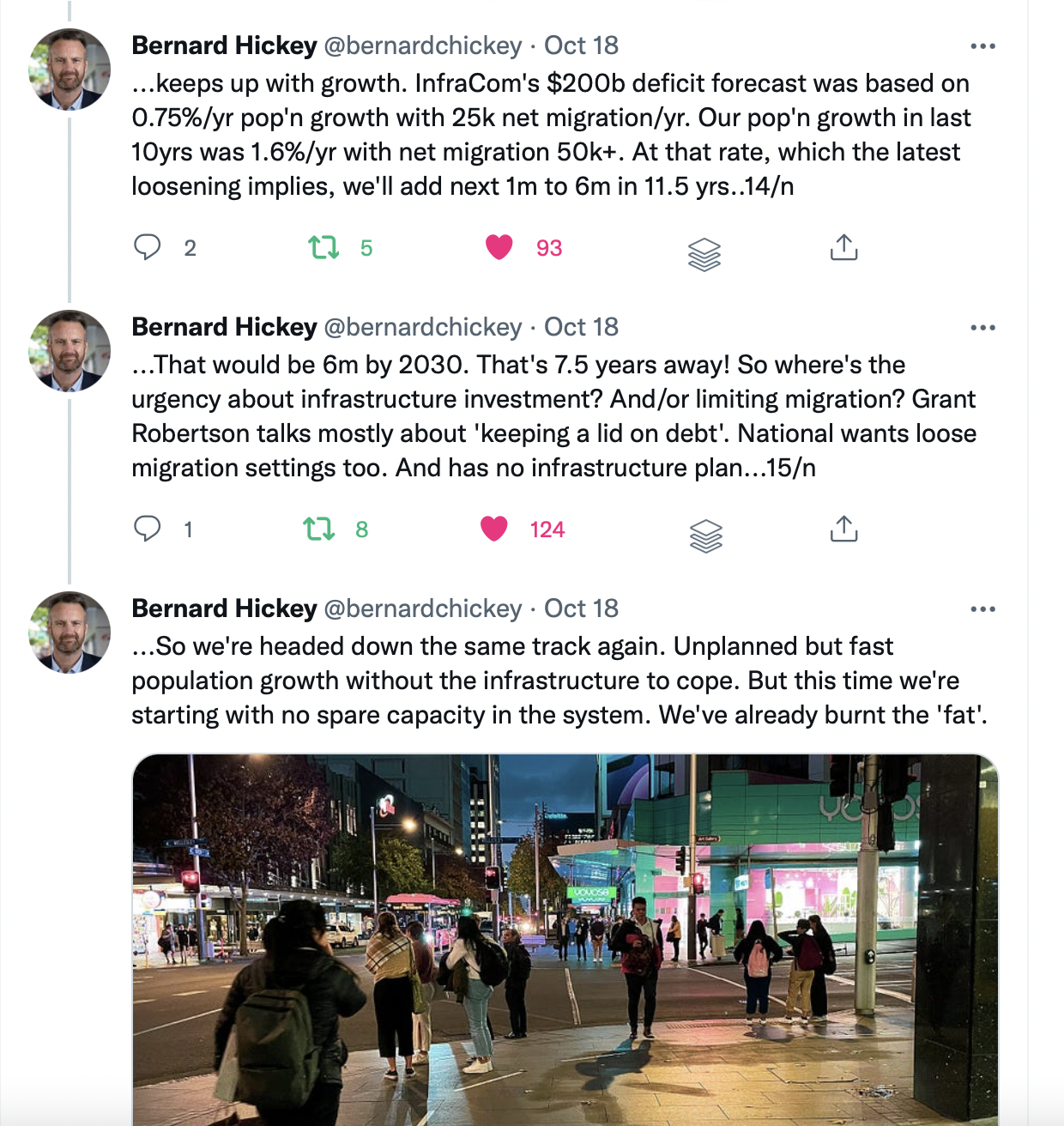Bernard Hickey is one of the most important political economists in game, his ability to use research to explain complex economic processes while explaining it’s political dimensions makes him one of the most public economists we have in NZ.
Here he explains the fundamental problem of the NZ Economy…





…the issue isn’t high migration, the issue is that neither National or Labour spent enough on infrastructure to keep up with the huge migration game.
It creates fake growth which in turn causes social friction as the domestic working class are pitted against cheaper migrant labour.
We are not an over taxed, over regulated economy!
Our top tax rate is the 39th highest in the world behind all the Scandinavian countries plus Germany, the United Kingdom, Ireland, France and South Africa!
Australia’s top tax rate is 47cents!
Our GST rate doesn’t even get us into the top 50 and our corporate tax rate is 40th while Government spending against GDP ranks 56th!
And we are voted easiest to do business by the World Bank!
I’m not looking for socialism here folks, just basic garden variety regulated capitalism!
We are addicted to a low wage economy because 30 years of neoliberalism has gutted the union movement.
That’s why I love listening to those who have exploited that low wage economy screaming in agony now…
Rotorua hospitality businesses shut down on Monday in protest at not being able to get the workers they need.
One says it will be catastrophic for the tourist town if they can’t get staff before summer.
…unfortunately, Labour have given up and singled they will open the immigration floodgates and start the same dynamics that have gridlocked Auckland into stand still…
Government immigration announcement sees skilled migrant, parent categories reopen
The Government is opening up two more categories for migrants to become residents as it seeks to reconnect with the world after the pandemic and fill major workforce shortages.
Immigration Minister Michael Wood has announced today the skilled migrant visa category, that was paused during the height of Covid-19 and border closures, will reopen along with the parents category from mid-November.
Consultation is also going to begin on a new uncapped and “simplified” points system for migrants that fall outside existing programmes.
This follows the Green List, which provided pathways to residency for the 85 most-needed professions.
…yay, more International Student Scams, more exploited migrant workers and more hyper tourism – all the things that fucked us last time around.
Yay.
We are so addicted to a low wage economy that we will risk triggering a spike in unemployment to capitulate to big industry who are reliant on cheap labour.
This will see unemployment rise as big industry dump Kiwi workers for their cheaper imports and we will see the impact of this next year as the recession kicks off.
To inoculate the country against these dynamics, we urgently need the Fair Pay Agreements to ensure the imported workforce are unionised.
It’s a hell of a juggling act, but if anyone can do it, it’s Michael Wood.

Increasingly having independent opinion in a mainstream media environment which mostly echo one another has become more important than ever, so if you value having an independent voice – please donate here.
If you can’t contribute but want to help, please always feel free to share our blogs on social media



When National are in government they cut taxes and reduce the ability of the state to borrow and invest for the future. When Labour are in government they attempt to make do rather then make the case for higher taxation. Rinse and repeat – eventually the state does not have sufficient revenue to borrow to engage and invest in the economy and infrastructure for future generations. Over time the economy gets weaker and the private sector has neither the will or capital to do anything about it.
This is exactly what’s happened in the UK – 12 years of tax cuts and austerity have resulted in weak growth and low productivity. But this is democracy at work – no-one will ever vote for a political party that advocates raising taxes so taxes can only ever keep going down.
I will vote for any party that brings in capital gains tax and shifts the lower 3 tax bands in favour of the poor and middle classes. Easily.
Too much immigration it’s the same the world over.. Winston Peters was right and FOR YEARS. Talk about turning a country into a cesspool, look at Britain FFS.
I conclude Mr Hickey is 100% correct. And I really don’t know where this faith in Michael Wood comes from. Especially in relation to the climate/rail protest in Wellington, he’s demonstrated just how myopic he can be!
However, on transport infrastructure spending deficits – stating suburbia is all double cab Ute driving is not helpful, actually its wrong and a standard from the anti car pro bike lobby. It’s unhelpful because the alternative offered to the traveling public, buses, is so interior it simply doesn’t rate.
The spend required for real alternatives is massive and neither major party has the vision or will to commit to any such course of action. The protests in Wellington regarding rail demonstrate just how disinterested Labour Greens are in anything meaningful but talk and distraction.
So if nothing else what Bernard Hickey tells us is Labour and National are impossible to distinguish, same shit different bucket of unimaginative dweebs, stuck in the past! He’s right!
Mr Hickey is indeed one of the few pundits with half a brain at least. His podcast is one well worth listening to. He makes a definite left wing analysis, without waving a partisan red flag. His work on the massive COVID bonus to the propertied sector was impactful, and ignored by most of the media, and renters I guess.
And he has drawn attention to the generational roadblock known as the Parliamentary Monetarist Consensus. Which means whether there is a Nashnull or Labour led Govt. we are still stuck with contracting out, Reserve Bank Act, State Sector Act, rampant Public Sector fifth columnists, punitive MSD, multi agency unaccountability and all the rest of the mile high shit stack that is neo liberalism.
NZ has crumbling infrastructure, not enough of “this” or “that” like so many countries.
It needs a popular political campaign, some fighting unions and new gen votes to finally sink Rogernomics.
Won’t happen in 2023 so that is another reason for a Labour/Green/Māori Govt.–buy time to organise against them all.
Martyn, while I am in principle against the excess immigration we have experienced over the last 20 years, the reality is that Boomers and Gen Xers did not have enough kids, so if you look at the population by age cohorts we are short in the 10-20, 21-30 and 31-40 and very heavy on the 40-50, 50-60 etc and the structural shortfall will only get worse. We can encourage people to have bigger families now, but that won’t make a difference for 20+ years. Till then we have a shortage of people at the early/ lower end of their careers. We should of course encourage older workers and those out of the workforce to meet the shortfall. That has already been done. It’s a rock and a hard place.
Bernard Hickey, while I enjoy his musings, is almost always wrong about everything (especially economic policy). Governments in democratic countries always take the path of least resistance (since they do not want to get voted out). This generally means doing nothing which, remarkably, 9/10 times works out better than deliberately messing with economic systems no-one really understands. Labour’s fiscal policy has always been better than National’s on balance (at least in my lifetime). Unfortunately, just about everything else to do with this current Government is a trainwreck. Jacinda resigning would be an excellent start to “fixing” Labour.
Certainly there is an infrastructure deficit in terms of a useful national rail system but surely the real problem is the rail system needed to be reduced to a modern 1200 (2000km ) rail passenger and freight system which might run fast multiple unit diesel trains 6 x a day between Wellington and Wanganui, Christchurch and Dunedin and Auckland and National Park and Auckland Tokoroa. I am sceptical if the cost of keeping the Ch PIcton route open since 2003 is justified or the new rail ferries. THe South Island in many ways would be better off if it had remained a seperate county and the post earthquake restructured governance in Christchurch, Three Waters and the recent health restructurre are all mechanisms for imposing a centralised model on NZ whcih is unfair and retrogade for the South Island which is distant, largely white and was not in the twentieth century aritificially stuctured on protected manufacturing industries, protected industry so far as it existed in the South Island, eg Taits, Fisher and Paykell and Lane Walker Rudkin generally ran on rather more commercial lines.
Instead of spending on the Auckland loop and the west line electrification, which is not much patronised since covid and was always essentially a local service and school train function. That money could easily have financed full electrification of the NIMT and with the modernisation of the Wellington system 10-15ys ago surely the Paraparamu- Wellington section could have been converted from DC to AC current with the rest of the NIMT. Only the Tauranga – Auckland line seems really justified from a freight point of view and the maintenance of the NIMT is more as a strategic reserve so maybe a new route from Te Kuiti to Eltham and Marton to Levin could be constructed to provide a faster, smoother more sustainable system- given the earthquake risk. The Hawkes Bay and Masterton North and south of Mosgiel , Southland lines should probably be sold to a private short line operator or two.
You’re right in that we are addicted to a low wage economy, but the reason is not what you might think.
OK, so do we want to be successful like Sweden? Because I’d sign up for that!
The Swedes certainly have high income taxes to pay for their expensive social programs, but they have very low corporate taxes which encourages business to set up shop there. Those businesses generate high paying jobs and upskill locals.
Unlike us, they have a highly educated workforce, so they don’t need to import skills like we do. The main reason for this is their high performing education system, which is driven by their education voucher system, where every child gets an education voucher that can be redeemed at the school of their choice, private or state. Schools that deliver poor results don’t get revenue so must sharpen their act to avoid eventual closure. Would Labour swallow that dead rat? Or would they back the teachers’ unions in preference to furnishing our children with the best possible education?
The choice is ours
Can you imagine the unintended consequence schools competing to just “rort pass” every student to gain more revenue! This is NZ not Sweden, it would be Wananga golf studies all over again.
That lack of infrastructure is mostly inconvenience for the middle class. It is a survival threat to the working class. It includes the fragments of the ‘social contract’ a deal about our basic obligations to those at the bottom. Our fellow people. Human beings.
Jobs, resources, homes, education, apprenticeships, medical and hospital treatment, transport – all the means to survive. And this includes the means to procure the means to survive.
I don’t think people want to give up the pleasure of scapegoating those at the bottom, and won’t even listen until it is about their own survival. And it will be for many.
As the squeeze continues more and more people will find themselves on that same scrapheap via brutal attrition increasing in degree and consequence across time.
I have heard that a South African business here in NZ is bringing in black people from that area as carers for the elderly. I am told ‘that there are no good workers from NZ able to fill the positions.’ If so, it points to NZ society having lost its ability to nurture and advance its own people.
Once we took steps to help the South African black people get agency in their own country, and change the power imbalance. Even after the 1960 Sharpeville Massacre (deaths 69, injured 180) and the suffering of leaders such as Nelson Mandela and Steve Biko, it seems that black people in South Africa still retained personal integrity, commitment and determination to be a cohesive, co-operating people despite it having become quite crime-ridden. Now perhaps the blacks and coloureds (descriptions in common usage and explanation) there can reach out a hand to us whites and browns over here who lack their indomitable spirit. It seems we need you. They are still struggling about race though.
A 2021 BBC piece looks at what we may have to face if we aren’t wise.
https://www.bbc.com/news/world-africa-55333625
A bit of orientation – Womad style:
the Zulu
The largest ethnic group in South Africa is the Zulu and the majority of them live in KwaZulu Natal Province and Gauteng Province.
The second largest is the Xhosa group; they are located in the Eastern Cape Province and Western Cape Province.27/08/2019
Race and ethnicity in South Africa | South African History Online
https://www.sahistory.org.za › article › race-and-ethnicity-.
Miriam Makeba sings ‘Baxabene Oxamu’ in Xhosa – https://www.youtube.com/watch?v=Rq9mU8inMr0
Learn Xhosa and be happy https://www.youtube.com/watch?v=vOv5N-PuSEA
Why is the government opening the parent visa category again? (The only reason I can think of is a desperate grab for a few more votes in next year’s election). We constantly hear that New Zealand has an aging population with less young people than we need to pay for our current pension requirements, yet now we’re inviting more old people who never paid a dime in tax in New Zealand to make full use of our single-payer health and welfare systems??!! That sounds like the definition of madness to me.
But hold on another view is that having got the advantage of these great social security systems they are going to try and vote and keep them in; it could have a good effect on the country’s welfare systems. I say that hopefully.
Agree Simonm. From a social perspective it encourages young immigrants if they can also bring their parents, keeps families together for the shift to a new country. It’s just not practical for those already here. We can’t afford it. It’s a “nice to have” for the immigrants, but not the way to dig ourselves out of the mess we are in. Our collective ideals around priorities needs to change and it will. It will take time and the boomer death spiral will help hurry it along. Along with the caziness that will be for the next few years. Humanity has fractured and must be reassembled better, letting go of old paradigms ingrained into us that are not our own. Jmo
If Three Waters isn’t “really about co-governance”, as Bernard asserts, Ardern and Mahuta would have ditched that aspect long ago given its widespread unpopularity. (Ardern, in particular, has ditched policies dear to her heart (such as a CGT) just as soon as the polls arrived on her desk. She has also shelved others (such as hate-speech laws) quickly once stiff opposition has become apparent.)
Co-governance is the most bitterly resented aspect of 3W yet the fact Ardern is still backing 3W and Mahuta and won’t change course tells you everything you need to know about the importance of co-government.
It was also a non-negotiable bottom line when the Working Group was formed late last year to “improve” 3w.
Bernard is right, in one limited sense, about 3W not being about “co-governance”. If he read (and understood) the scope of Section 140 of the WSE Bill, he would click that the real purpose of 3W is to hand iwi direct and comprehensive governance below the strategic levels of the (co-governed) Regional Representative Groups. This will be achieved through the Te Mana o Te Wai statements outlined in S140 and which only iwi and hapu can issue. They are binding on the WSEs.
That virtually no public commentators — with the notable exception of Thomas Cranmer — still do not understand this is both extraordinary and depressing. The TMoTW statements are key to understanding the whole point of 3W.
And guess who oversees them? Tipa Mahuta, as chair of Te Puna-The Maori Advisory Group that controls the water regulator, Taumata Arowai.
The choke-hold is complete.
Thanks Graham Adams. I like the sound of co governance but have no knowledge of how that works. What water control function does Taumata Arowai do?
Hi Sinic, The water-control function of Taumata Arowai is primarily regulating the quality of water. But it has a secondary (but important) function as a vehicle for enabling matauranga Maori / tikanga to be incorporated into water services (via TMoTW statements).
This article (republished on Point of Order) by Thomas Cranmer sets it all out in detail:
https://pointofordernz.wordpress.com/2022/09/29/thomas-cranmer-three-waters-taumata-arowai-and-the-scantly-diluted-powers-of-minister-mahutas-sister/
Apologies… the sentence in my comment should have read:
That virtually no public commentators — with the notable exception of Thomas Cranmer — understand this is both extraordinary and depressing.
This seems a matter of concern in the political economy:
https://www.rnz.co.nz/news/business/477224/kids-stuck-with-2000-bill-each-for-kiwisaver
New Zealand children born to parents who are citizens of the United States face a difficult KiwiSaver choice: Give up your US citizenship, or face a KiwiSaver tax compliance bill of $750 or more a year courtesy of the US taxman.
A petition has been started at Parliament asking MPs to change the KiwiSaver Act to allow people with KiwiSaver accounts facing the unreasonable demands from US tax authorities to close their KiwiSaver accounts.
The issue surfaced as a result of the plight of Auckland dual national Kira Bacal and her four New Zealand-born children, Harper, 13, Rowan, 10 and twins Malachi and Elias, 8.
Are the parents trying to have a bob both ways? I have seen USA people come here and utilise our economy but the pull of the USA has won, and sometimes they have left businesses with a lot of debt borne by NZs on the ground, and further dug in after the visitors have turned tail.
NZ Govts need to start being soverign again and stop enforcing US laws and red tape. Why does kiwi bank have to every year send out a USA tax compliance form to its customers – red tape and cost to its customers for what? The idea that other soverign countries apply US laws is appalling as Julian Assange can attest.
“The rule of thumb long used by real estate agents and homebuyers is that you can afford a house if its price is equivalent to roughly 2.6 years of your household income” .May 2018 Bloomberg while The United Nations reckons the housing affordibility ratio should be 3.0.
NZ median wage is $61,000 ($1189 per week StatsNZ Jun22)
NZ median house price $956,000 (QV Sep22)
Which is a housing affodability ratio of 15.0. The median NZ wage needs to rise to $300,000 or the median house price needs to fall to $180,000 to make housing affordibilty good or “normal” here.
Increased migration only exerbates this problem. Its a dampener on wages which need to rise by a factor of 5, its a disincentive to paying more to low skill kiwis, its a disincentive to training both high and low skill kiwis, its a disincentive to retaining high skill kiwis in NZ, its a disincentive to business to incease capital investment to attain higher labour productivity, its a disincentive to investors and banks to loan to business and banks rather than on housing.
The covid immigration halt has been great for the economy wages have risen house prices have fallen. Housing supply has had a chance to catch up. A flood of immigration will not see NZ return to being a high wage economy.
Winston says he wants a high wage economy and is against immigration but when he has been in power he never used an immigration handbrake.
Labour giving into the hospo/horticulture sectors is crazy when there are 140,000 poverty stricken unemployed kiwis who need some training, a decent wage and a stake in society.
Joseph Well said x100.
Funny how not one comment suggests raising taxes on the wealthy and investing in the stuff we need to support wider society and immigration. It’s as though this is, not just forbidden, but has been physically removed from the collective memory.
I live in a country of very small minded people who have been given the right to vote in elections – I can’t actually handle following politics anymore because voters are so economically ignorant and ill informed that they’d vote to close a public hospital if it meant a load of immigrants get deported.
This is what happened in the UK over Brexit – it’s a kind of manipulated psychological sickness and has devastating long term economic and social consequences as people in the UK are now finding out.
If you aren’t prepared to tax and recycle wealth back into your economy you can only get collectively poorer – that is what Bernard is trying to say you fucking morons.
Comments are closed.